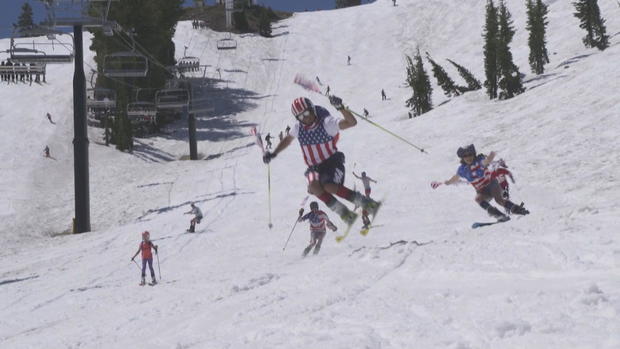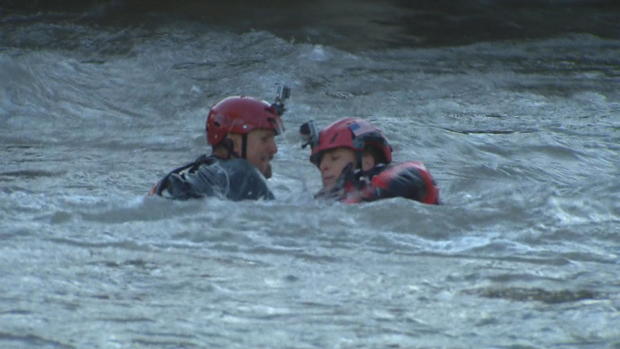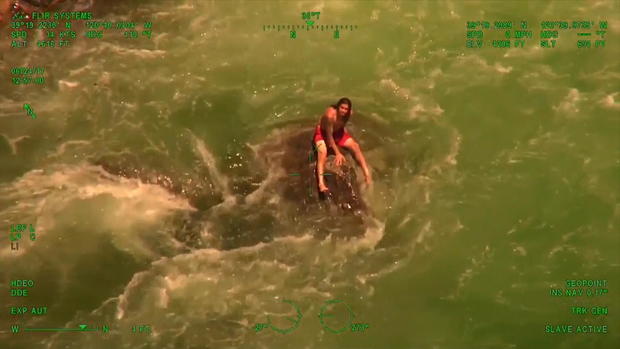Rare Calif. summer snowpack fun for skiers--but spawning raging waters downstream
Ski lifts ran on Independence Day at Squaw Valley Resort for the fourth time in history. But as the winter's record-breaking snow melts, it's creating raging rivers downstream where dozens of people have already been rescued from the Truckee River.
In the High Sierra of California, it's continuing to look a lot like Christmas -- but in July.
Two weeks after the official start of summer, skiers at Squaw Valley are refusing to let temperatures near 80 degrees melt away their favorite winter sport, reports CBS News correspondent Carter Evans.
"They're basically the same, they're just wearing less," Andy Wirth said of the difference between a winter skier and a summer skier. Wirth is the president and CEO of Squaw Valley.
Wirth thanks last winter's epic snowfall for his ability to keep the chairs lifting into July.
"We have this concept where we're going to run it as the 2016, '17, '18 season, we're going to take two ski seasons, put 'em together. This is absolutely uncharted territory," Wirth said.
But while some folks are rushing downhill, federal snowpack monitor Jeff Anderson is heading up to check on a data collection site nestled between runs.
"It basically is a big scale that measures how much weight there is in the snowpack," Andersen said.
Although one is empty, a few mountains over, a different station is still buried in winter.
"There's about four -- a little over four feet right now we're standing on" Anderson said. "We had two and a half times, that's 250 percent, means two and a half winters of snow, we got this one winter."
As it melts, most of the snow in these mountains flows downhill to the same destination: the 191-square-mile catch basin known as Lake Tahoe.
"We have seen more inflow to the lake this year than any year since we have records back to 1900," said U.S. District Court Water Master Chad Blanchard.
Blanchard keeps an eye on water levels at the lake. In just one week during California's recent heat wave, more than 12 billion gallons of water poured in. It's now only two inches from being full.
"There are 63 identified streams that feed Lake Tahoe," according to Blanchard. But the only route out is the Truckee River.
"That means a significant amount of water coming out the Truckee River," Blanchard said.
Because of this year's sheer volume, Blanchard has had to release 10 times more water through this dam than in a normal year. That's causing serious trouble downstream.
Search and rescue teams down in Reno, Nevada are training for the worst. They've rescued more than 20 people from raging currents so far this year and at least three have been swept to their death.
"It's flowing about at least double of what we would normally expect this time of year," said Mark Bell of the Washoe County Hasty Team.
Bell says recreational swimmers and kayakers are being caught off guard by a river that's usually far more placid.
"They'll decide to just maybe get in the river just a little bit and then the river basically takes 'em off their feet," Bell said.
It's happening all over the west. The California Highway Patrol recently plucked one man from a rock in the middle of the nearby Yuba River. He was just a few feet away from plunging over a 50-foot waterfall.
Authorities say training exercises like these are essential, because while the water is raging down in Reno, there's plenty more where that came from back up here.
"Most climatologists will tell you that this is a function of volatility of weather patterns and we will see more like this going forward," Wirth said.






